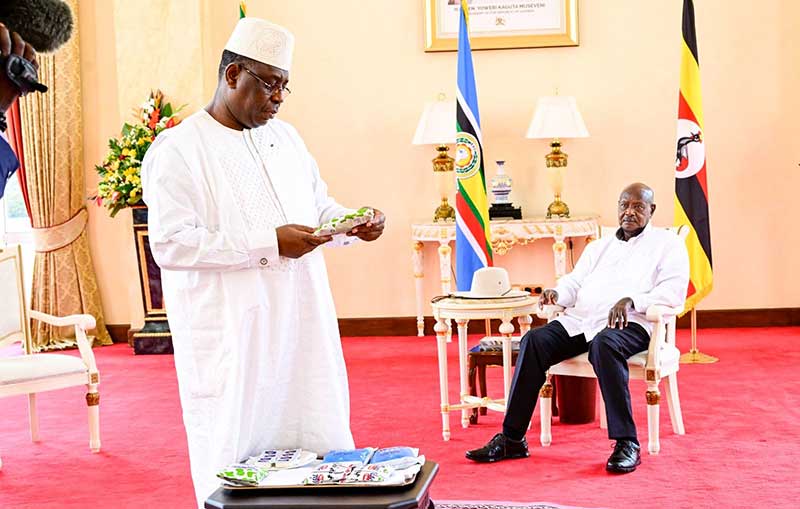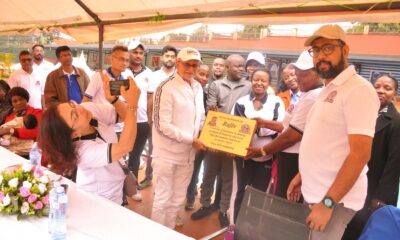Business
Hard lessons for Uganda from its dispute with Kenya over milk?

President Yoweri Museveni marketing Uganda’s milk to Senegals counterpart Macky Sall
The government of President William Ruto of Kenya continues to battle with strong dairy cooperatives that have consistently demanded that their government stops the importation of milk from Uganda because it undercuts them.
President Ruto has on several occasions been heard advising Kenyan diary farmers to stop blocking Uganda’s ‘cheap milk’ but instead think of adding value to theirs so that they can reap the rewards of higher value addition from the more advanced products such as butter.
But Ruto has been attacked for playing the political card using the opposition from farmers as an excuse to frustrate his predecessor Uhuru Kenyatta’s business of importing powdered milk into Kenya.
Uhuru’s family business Brookside, is a major importer of semi-processed milk in Kenya from Uganda. In June 2023 Brookside laid off some 200 workers on grounds that it had been denied export permits to Kenya.
Pearl Diary, the Ugandan company that produces Lato milk, on the other hand, continues to enjoy unrestricted access to the Kenyan milk market, a move that Ruto’s critics point to as a political vendetta against his former boss.
Uganda’s milk producers are bitter that Ruto is playing politics and violating principles of the East African Common Market principles of quota and tariff free market access.
Many have called for retaliatory measures against Kenyan products, although President Museveni is not keen on starting a trade war with his counterparts for obvious reasons that Uganda is a landlocked country.
This week, the Minister of Agriculture Animal industry and Fisheries Frank Tumwebaze lamented President Ruto’s remark that Uganda’s milk is cheap, as a selfish stance.
Tumwebaze reacted angrily to Ruto’s advice for Kenya’s dairy farmers who he urged to focus attention on high value addition for bigger markets.
The Ugandan agriculture minister said: “Well, the unpleasant connotations of the “Ugandan Cheap milk ” aside, how I wish the “talking” was followed by the “walking” & Kenya dairy board removed all its barriers of denying export permits to our milk exporters.
He added: “A trade relationship built on selfishness will always play counter towards the @jumuiya efforts !”
But Minister Tumwebaze was reminded that trade matters are not a love relationship but rather a vicious battle for self interest where no country cedes ground on the basis of charity.
Jimmy Kiberu, a businessman formerly working with Uganda Development Bank and a sharp critic of President Museveni blames the current crisis on government’s failure to develop effective local demand for milk and look to a far-flung markets in foreign countries.
Kiberu advised that: “Start by building local capacity and markets, that includes generating sustainable LOCAL DEMAND. Only after this do you seek to compete in EXPORT markets. Trade is ruthless! It’s not a charity affair. Use trade pacts and value addition to boost trade muscle.”
The ongoing trade wars between The United States and China perhaps serve to remind those who believe in free trade that it’s a myth and that each country must look out for its selfish interests.
One Mwesigwa Austin reacted to Minister Tumwebaz e’s complaint by advising him to develop capacity and take advantage of the proxity and other factors that Uganda has over Kenya to sell to the same markets that Kenya wants to beat us to.
Mwesigwa said: “Use his (Ruto’) idea and look for a market. @WilliamsRuto selfishly loves his country. Imagine a non-taxed Ugandan production line flooding the Kenyan market to compete with taxed Kenyan farmers. Meanwhile @KagutaMuseveni is in China and Russia lobbying not for market but value addition investment & guns.”
Ignoring the local market through economic policies that fail to lift up majority of the population from poverty, critics say it is coming back to haunt the Museveni government and his own personal interests.
Many see this crisis as self-inflicted on the part of the leaders who are themselves milk producers.
One Lenny Okello argues that: “The Odreks (referring perhaps to Odrek Rwabwogo, Museveni’s son-in-law) don’t know that if they empowered the majority of Ugandans, they wouldn’t be globetrotting looking for markets for our products. They have built an economy that works for a few people.”
The demand for an economically empowered population as the backbone of sustainable development, has got more backers.
Peter Ekakoro said: “In every country your population is the best and nearest market. But imagine even milk, we are looking to Kenya, not because we have surplus to local consumption, but because the majority of Ugandans can’t afford it. The Odreks need to think better. Uganda is better than this.”
Comments


























